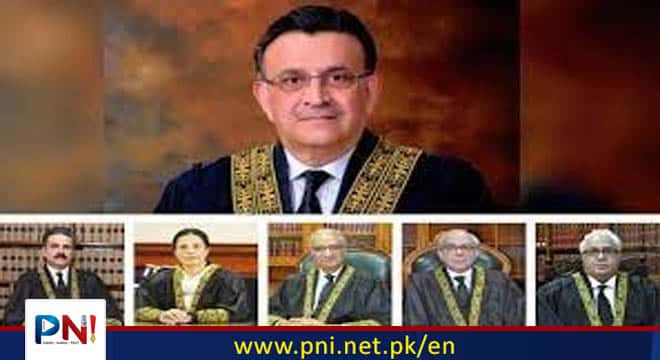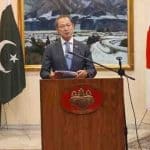ISLAMABAD July 18 (Online): As the Supreme Court (SC) resumed hearing petitions against trial of civilians in military courts on Tuesday, Chief Justice of Pakistan (CJP)Umar Ata Bandial made it clear that civilian citizens should not be subject to trials which are not in accordance with the Constitution.
Emphasising on civilians having constitutional protection, the CJP went on to say that the military courts conduct summary trials, do not issue reasons in their judgments, and don’t record evidences either; the courts are not open for the public.
Justice Bandial added that civilians should not be subject to undue harshness as he noted that military laws were very tough, and different from ordinary provisions. Nonetheless, he conceded that May 9 incidents were of a serious nature.
During the last hearing, the SC had summoned the record of all the alleged May 9 rioters – including women and journalists – in custody of civil or military authorities as it took up petitions filed against court martial of the people who vandalized army assets after the arrest of former premier Imran Khan.
The court also issued notices to all the people and institutions named as respondents in the petitions filed against trial of civilians in military courts under the Pakistan Army Act, 1952 and the Official Secrets Act, 1923. However, it rejected the petitioners’ request to stay the trial of the accused in military courts.
The proceedings had however been marred by controversy as at the outset of the proceedings a nine-member bench led by by CJP Bandial started hearing petitions filed by former chief justice Jawwad S Khawaja, Imran Khan, Pakistan Peoples Party (PPP) leader Aitzaz Ahsan and civil society, one of the bench members Justice Qazi Faez Isa raised a number of issues.
Justice Isa, who has already been notified as the next CJP three months in advance, took exception to the bench. He said parliament had passed the Supreme Court (Practice and Procedure) Act, 2023 which outlines a procedure for formation of benches in cases related to Article 184(3).
Justice Sardar Tariq Masood, the third senior most judge in the bench, had agreed with Justice Isa. He had asked how many judges will hear an appeal if the SC declares the Act valid.
Subsequently, the CJ had constituted a six-member bench — excluding the two senior judges who had expressed their serious reservations about the proceedings — to continue hearing the matter.
In a note that was part of the court’s June 23 order, Justice Yahya Afridi — who is part of a six-member apex court bench hearing petitions challenging court martial of May 9 rioters — had requested CJ Bandial to constitute a full court to hear the petitions.
Today, Attorney General for Pakistan (AGP) Mansoor Awan had referred to Justice Afridi’s note and requested for the constitution of the full court.
However, the CJP said that the matter has already been partly heard. It will be difficult at this stage to constitute a full court as some judges are not available and some have excused themselves, he said, before adding that the bench would ponder on the request and decide after discussing it among themselves.
Meanwhile, Justice Ayesha Malik wondered how firstly the government had raised objections on one member of the bench and now it is requesting for the full court comprising all available judges.
Justice Munib Akhtar noted that all six members on June 26 requested for the reconstitution of the bench as it heard matter.
During the proceedings, Irfan Qadir, counsel for the defence minister, wanted to raise objection on some members of the bench but AGP did not allow him.
The hearing of case was later adjourned until tomorrow.
Follow the PNI Facebook page for the latest news and updates.









